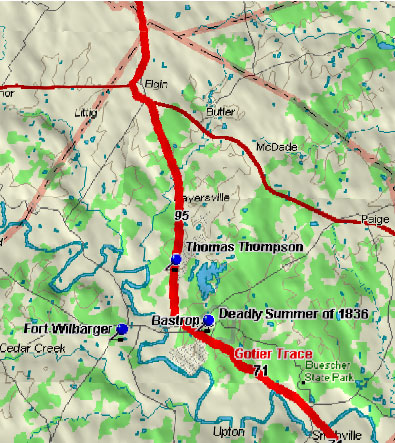
Bastrop
Marker Title: The Gotier Trace
Address: Entrance to Bastrop State Park, SH 21 at Loop 150
City: Bastrop
County: Bastrop
Year Marker Erected: 1967
Marker Location: Entrance to Bastrop State Park, Loop 150 &
SH 21
Marker Text: Originated in 1820s. Crossed the present counties
of Austin, Washington, Fayette, Lee, Bastrop; joined San Felipe, capital
of Stephen F. Austin's colony, with Bastrop. Marked by James Gotier,
a settler who (with several in his family) died in an Indian massacre
near this trace in 1837. Like most early Texas roads, this was only
a marked route which travelers could follow-- dusty in droughts, boggy
in rains. From such traces, wagon roads and cattle trails, Texas has
developed over 67,000 miles of fine paved highways-- a system recognized
as nation's finest. (1967)
Deadly Summer of 1836
* items are taken directly from the book, Savage
Frontier, by Stephen L. Moore.
On June 7 Indians plundered the house of Nathaniel Moore, and on
the next day, June 8, attacked the house of Thomas Moore. Veteran
ranger Conrad Rohrer was outside Moore's house at this moment attempting
to saddle his horse. Rohrer had served Sam Houston's army as a special
wagon master and had been among Captain John Tumlinson's early rangers
during the revolution. He was shot down dead in the yard.
In another depredation, Bastrop area citizen Matthew Duty was killed
while riding out alone one night to look over his crops. He had barely
gotten out of sight of town when shots were heard. His horse returned
on the run, its saddle splattered with blood. When an armed party
rode out to look for Duty, he was found murdered and scalped.
Also during the summer of 1836, Indians killed Texas pioneer John
Edwards, who had been traveling in company with Bartholomew Manlove
from Bastrop to Washington. Manlove rode for his life,but the Indians
killed Edwards. He was repeatedly speared and then scalped. The Indians
took his horse and rifle.
Laban and Jarrett Menefee and John Marlin fought four Indians near
the Colorado River. One Indian was killed and all three men claimed
credit. They examined the body and found two bullet holes no more
than two inches apart. They went a little further and were attacked
by more Indians in which they managed to kill two. They chased the
remainder into a timber thicket, killing one more in the process.
Also at this place, Harris, Blakely and another man came down the
river to slaughter a cow when they were attacked in a ravine. Blakely
escaped but Harris and the other man were shot and dismembered and
their entrails were strewn around the bushes. They cut off their arms
and removed their hearts, which were apparently eaten by the Indians.
Joseph was attacked by forty or more Indians, reaching his own house
before he died. His wife drug him to safety before he could be mutilated
or scalped. His brother attacked the camp with some volunteers and managed
to kill the chief before being killed. The others in his party were
wounded which may explain why they scalped the Indian. End of Deadly
Summer of 1836.
Josiah had joined Stephen F. Austin's colony in 1828 and received a
Mexican land grant in present-day Bastrop County where he settled in
the community of Utley near the Colorado River. The Wilbarger's home
consisted of a cabin and a stockade that may have been a family fort.
He also prepared a cave in the banks of the Colorado River for shelter
in case of Indian attack. Little else is known about the fort. At one
time there was a commemorative marker at the site of Wilbarger Bend
in the Colorado. If the marker still exists, it is now on private property.
The balance of 1827 and 1828 found Austin Colony settlers and the native
Indians on somewhat better relations. In July 1829, however, a battle
was fought against Indians who had taken control of Thomas Thompson's
small farm near present Bastrop on the Colorado River. Thompson led
then men in a fight against the Indians, killing four and chasing away
the others. Colonel Austin ordered two volunteer companies of fifty
men raised. The companies were under Captains Oliver Jones and Bartlett
Sims and under the supervision of Colonel Abner Kuykendall. Captain
Harvey S. Brown raised another volunteer company during this time due
to murders and depredations committed by Indians around the Gonzales
area. Although Captain Sims and his company scouted extensively in pursuit
of the Indians, these combined forces only managed to kill one Indian
while on their offensive. |